#african american studies
Text


409 notes
·
View notes
Text
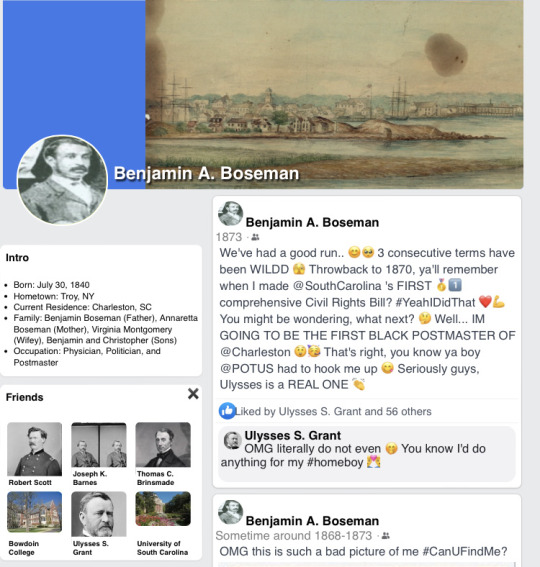
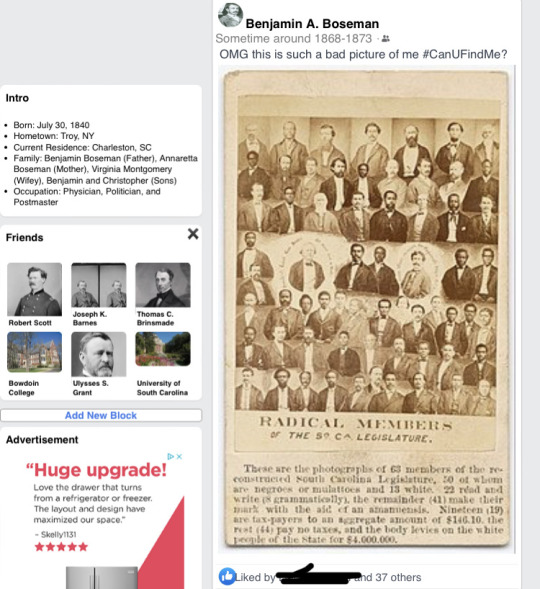
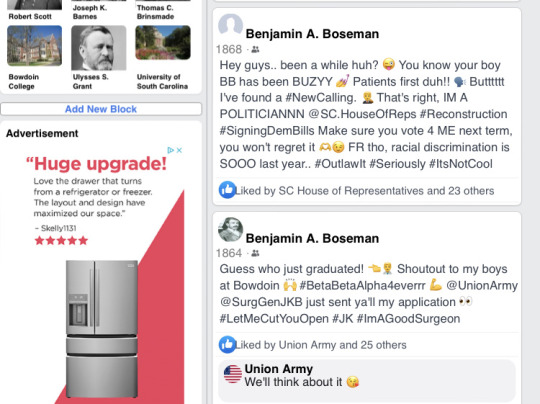

Y’all my classes made fake social media profiles/posts as Reconstruction Era black politicians and this shit had me DYING 😂😂😂
#teacher life#love my job#black history#African American studies#reconstruction#favorite period in us history
35 notes
·
View notes
Text
A brief lesson in Black Excellence.
15 notes
·
View notes
Photo
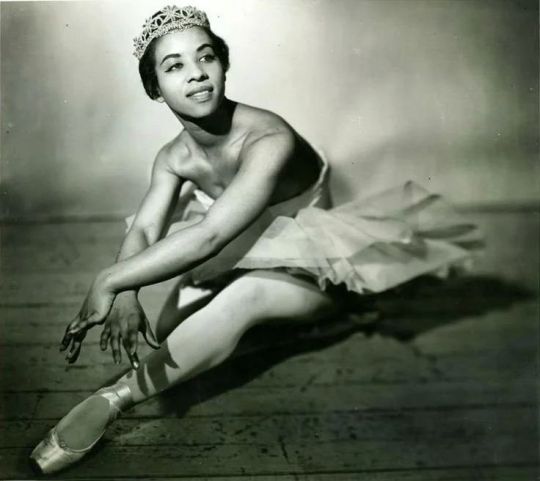
On This Day in New York City History February 2, 1935: Dancer Anne Raven Wilkinson (February 2, 1935 – December 17, 2018) was born in New York City, New York. Wilkinson has the distinction of being the first African-American woman to dance for a major classical ballet company.
Wilkinson was born into a middle class black family in Harlem. Her father was a medical doctor and her mother a ballet dancer. Her love for ballet was born from watching a performance of the Ballet Russe de Monte Carlo, a dance group that she would make history with.
Wilkinson would face difficulties in getting accepted to the Ballet Russe de Monter Carlo. Twice she was rejected before she was accepted at the age of 20 in 1955 by the director of the Ballet Russe de Monte Carlo, Serge Denham.
After leaving the group in the early 1960, Wilkinson would dance with a number row groups before retiring in 1974. That would be a short lived retirement. In the same year Wilkinson would join the New York City Opera and dance for them until 1985. In her later years she would serve as mentor to Misty Copeland who was a trailblazer in her own right. Copeland was the first African American to become a principal dancer at the American Ballet Theatre.
Wilkinson passed away on December 17, 2018 at the age of 83.
#AnneRavenWilkinson #BalletRusseDeMonteCarlo #AfricanAmericanHistory #AfricanAmericanStudies #BlackHistory #BlackStudies #BlackHistoryMatters #WomensHistory #WomensStudies #HERStory #DanceHistory #NewYorkHistory #NYHistory #NYCHistory #History #Historia #Histoire #Geschichte #HistorySisco
https://www.instagram.com/p/CoKa8wxuhZG/?igshid=NGJjMDIxMWI=
#Anne Raven Wilkinson#Ballet Russe de Monte Carlo#African American History#African American Studies#Black History#Black Studies#Black History Matters#Women's History#Women's Studies#HERstory#Dance History#New York History#NY History#NYC history#History#Historia#Histoire#Geschichte#HistorySisco
48 notes
·
View notes
Link
The Legal Defense Fund (LDF) and other civil rights organizations sent a letter to the Superintendent of the South Carolina Department of Education denouncing its decision to remove course credit for Advanced Placement (AP) African American Studies. The civil rights organizations urged the S.C. Department of Education to restore academic credit for the course, citing the importance of fostering inclusive education for all students.
3 notes
·
View notes
Link
25 notes
·
View notes
Text
“African American women are standing in a room skewed by stereo-types that deny their humanity and distort them into ugly caricatures of their true selves. As they struggle to find the upright in this crooked room, they are beset by the emotional, physiological, and political consequences of race and gender shaming. This shaming has tangible, even disastrous consequence”
—Melissa V. Harris-Perry, Sister Citizen
To be honest, this  quote applies to all Black women and women of African descent globally
#Melissa Harris-Perry#black women#african american#African#misogynoir#misogyny sexism#antiblackracism#antiblackness#black woman#mixed race woman#biracial#dark skin#natural hair#Melissa Harris Perry#writer#scholar#crt#critical race theory#black studies#African American studies#society
2 notes
·
View notes
Text
Our Hidden Flag
Our Heritage Flag & Crest as Black Americans by Kièl Young
What’s popping Hood Babies & Baes, I’m not gonna lie when I first discovered this, I had a mixture of feelings, and the fact that it’s kinda been hidden from us and past generations is sad. Nonetheless, it’s better to know now than not know at all. If you’re a historic nerd like myself, this post is just for you; however, even if you’re not you’ll wanna read this piece. I know personally, as a kid I grew up in a melting pot, Miami was the spot where everyone can share their culture and rep their flags to the highest, shoot one of my godfathers were Cuban. However, as I got older I always wondered why we didn’t have a flag, I mean we have the Pan-African flag but we don’t have a flag as Black Americans. That’s where the Black American Heritage Flag comes in. Scrolling through tiktok I saw two videos that really touched my heart to make this piece. A lot of us didn’t know that we have a flag, so if you’ve ever felt left out or maybe lost—don’t. Just like we have our own culture, we have our own flag as well. The Black American Heritage Flag was created and designed by Melvin Charles & Gleason T. Jackson in 1967. It’s not as mainstream as the Pan-African flag, so sadly if you’d like to get one where you can hang it, you’d have to get it personalized. Let’s break down what the flag means.The red of the flag symbolizes the blood of our people that was shed, the black in the center is the pride of our skin color, our people’s pigmentation, the wreath is the symbolism of peace, prosperity, everlasting life, and finally the sword is the pride for our heritage. Many of us don’t know about this flag, like I said I just discovered it. Having this flag is an open invitation to talk to the future generation about it, when you see others looking for their identity in their blackness, it can be hard until you realize that our culture is in everything. I’ll definitely be waving this flag this Juneteenth, to show that we’re not left out, we aren’t last. You can be prideful in this flag and it’s time that we make this flag as mainstream and popular as the Pan-African Flag. I have my Pan-African Flag in my home, and I don’t plan on taking it down at all but it’s nice to know that as a black woman in America, I have a flag. This one was short, and sweet but I promise I got another post for you coming soon, til then, stay good wid it hood fam.

#black community#black girls who write#black women#blackbeauty#blackgirlmagic#blackwriters#black heritage flag#museology#african america history#african american studies#black history#black archives#black excellence#black is beautiful#black tumblr#blackgirlswhoblog#black men#hbcu
4 notes
·
View notes
Text

Story
21 notes
·
View notes
Text
Why was Killmonger so relatable?
With the social climate being as it is, I feel the need to share a small analysis that I had written in 2018 regarding the Marvel superhero movie Black Panther, it’s villain Killmonger, and why it seemed that numerous Black Americans held sympathy and even relatability towards the character. I have slightly edited it for the sake of better clarification, but have not added anything additional to my original message.
If you have not seen Black Panther, I highly recommend the watch, and also would like to warn you that the post below contains mild plot spoilers.
As you read, I ask that you keep in mind the fundamental truth that it is possible to sympathize with and even agree with some points made by a villain while also simultaneously holding them accountable and objecting to their methods. By no means do I wish to glorify or romanticize Killmonger (nor was the intent of Marvel or Disney when they characterized him), but I would be remiss to deny the very real place in which the character was built from. The foundation in which Killmonger was based on is a very real issue within the United States that social justice and civil rights activists continue to diligently combat.
Please, do not use the character Killmonger and some people’s ability to sympathize with him as justification for anti-Blackness or to vilify important social movements like Black Lives Matter.
The thing you need to understand about people liking the character Erik “Killmonger” Stevens, despite the fact he’s the villain, is this:
His character is relatable to a lot of Blacks in a lot of generations. Sadly, people getting shot is all too common in poorer Black enclaves (also commonly referred to as “hoods” or “ghettos”), and I think it’s not too far fetched to say that many Blacks in America have directly or indirectly known someone who’s been a victim to some type of violence in the hood.
More importantly, all Blacks have been victims to systemic, systematic, and general racism in some way or another; not to mention the events of Ferguson and so many Blacks having been shot down by police. As such, the general situation in America with Blacks is highly tense and oppressive with Blacks still feeling shooed aside. Like Martin Luther King, Jr. once said, “a riot is the language of the unheard.” Dr. King did not agree with rioting, but he made sure to state that he would not condemn it because he comprehended why riots occurred in the first place.
In comes Killmonger, a direct product of all that tension, frustration, and exasperation as well as of the inaction of others - their only justification for not reaching out to help being a blatant “well, it wasn’t affecting us, it’s not our fight”.
Killmonger was faced with violence at a young age, and he continued to grow up in violence due to location (Oakland) as well as the color of his skin. At a certain point, people become numb to violence like it’s second nature. You can get so numb that everything except for your desire to survive, even your morals and integrity, get tossed out the window. Preservation becomes your only goal for life, and as such you’re willing to sacrifice absolutely everything for it.
Killmonger’s story is close to home for a lot of Blacks because he symbolizes that hopelessness, bitterness, and defeated feeling that many Blacks are faced with.
His intention was not from a place of evil, he wanted Blacks to be able to rise up like a phoenix from the ashes. However, his methods are what damned him and even more damning was the fact that he had been so numbed from violence that he became just like his own oppressors. Violence is a circle like that.
Despite Killmonger being the villain, it is imperative to recognize that T’Challa, to some degrees, came to a place of agreeing with some of his message. He recognized the validity in Killmonger’s mission, which is what led to his internal conflict and to him questioning the tradition of Wakanda.
It is a vital part of Black Panther that the characters and audience recognize exactly what Killmonger was, and what T’Challa ultimately realized:
We create our own monsters.
Think about that the next time you criticize events like Ferguson or the Black Lives Matter movement - in which it should be noted that those were not violent, but some violent individuals took advantage of and used the movement to claim legitimacy. That, however, is a conversation for another time.
Think about that the next time you try to justify inaction and disinterest with ‘it doesn’t affect me’.
“In the End, we will remember not the words of our Enemies, but the silence of our Friends.” - Martin Luther King, Jr.
In rereading my own analysis, I would like to revisit the complexity of villainy presented within Black Panther to point out that, while it is understood by viewers that Wakanda is the heroic and shining example, the film places both Wakanda (particularly the Wakandan nobles in power) and Killmonger in a grey area. Returning to the point within my original analysis, T’Challa recognized the harm of Wakanda’s and his father’s inaction with the problems that African and Black diaspora face. It is this realization that Killmonger has valid arguments and valid anger that leads into T’Challa’s understanding that Wakanda must undergo social and political change.
T’Challa actively expresses his disappointment in his father and in the Wakandan government, acknowledging the pain and suffering that his country contributed to with the decision to remain passive and “neutral”, at best, or toxically self-preserving, at worst.
All in all, I would go so far as to claim that Black Panther is an exceptional example of the complexity of humanity as well as serves an important reminder that sometimes villainy and heroism are not clear-cut black and white.
#author's note#pop culture analysis#long post#black panther#killmonger#erik killmonger#erik stevens#mcu#marvel cinematic universe#social justice#race relations#blm#black lives matter#marvel characters#critical race theory#critical race studies#black culture#black history#african american studies#substack saw it first#op ed#opinion post#writeblr
4 notes
·
View notes
Text


#black history#black lives matter#black tumblr#black literature#black history is american history#civil rights#black excellence#black community#civil rights movement#black and white#educated black men#black lives#college#segregated#segregation#black culture#black history month#african american men#african american studies
20 notes
·
View notes
Text
Could #AbbottElementary even have afforded to employ a teacher to come up there and teach Black History for #BlackHistoryMonth? Unless they were willing to work for even lower pay or school credits or it was a volunteer position I doubt it.
Seriously, I'd be all for a Black teacher teaching Black history (even though Jacob did do a great job) but did this man expect a school that can't even afford supplies or one computer to pay for a teacher that's only going to be around for 28 days?
Doesn't Melissa teach two grades and they have to basically pay out of pocket for school and cleaning supplies?
Imagine taking this job (or volunteer position) for #BlackHistoryMonth then finding out you have to buy your own supplies and books for each student. (If not each history class). So that's your entire pay for that month. You're paying to work.
I copied and pasted this from my Twitter thread.
I have one more question. Would Jacob still be getting paid or would be jobless and without a paycheck for a month to for the sub while the sub basically has to spend both their paycheck on books and supplies?
#abbott elementary#black history month#black studies#african american studies#black history#abc#jacob hill#quick question#ava coleman
19 notes
·
View notes
Link
I was super skeptical of the guy from the college board I saw interviewed recently claiming there was no contact and they just decided to gut the course independently. I feel vindicated in my skepticism.
8 notes
·
View notes
Text
Reimagining the Black Jezebel
Through Black Girl Magic
(An NFT Collection)
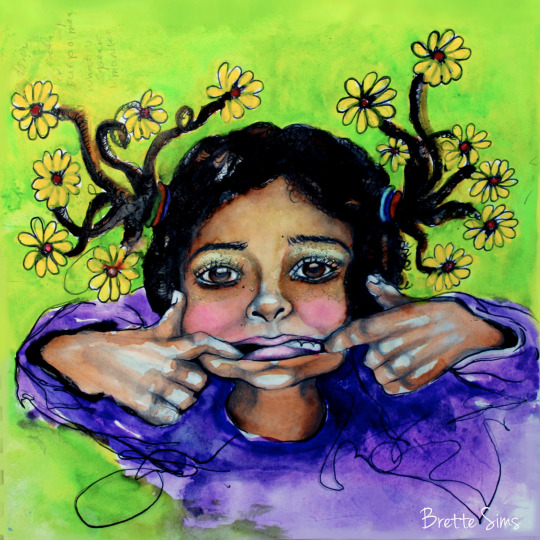

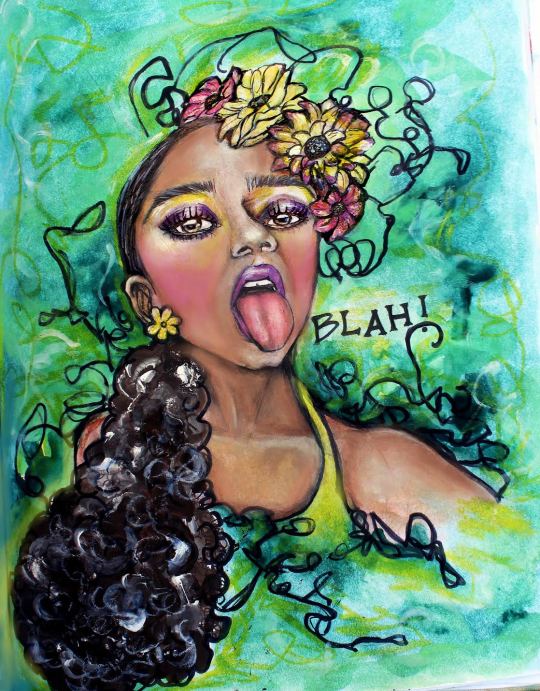
Did you know that historically black women were portrayed as promiscuous and even predatory. Black women socially fit in one of two stereotypes: The Mammy or The Jezebel. The Mammy stereotype depicted black women as unintelligent and motherly working within white households as the nanny or cleaner. The Black Jezebel was a stereotype that portrayed black women as tempting, and lewd in contrast to white women who were portrayed as models of control, self respect and modesty.
I believe black women have a rare natural magic and alchemic power, so this collection is a reimagining of stereotypes through black girl magic and the beauty of nature.
This is a re-envisioning black women as being a model of respect no matter what proverbial box she is placed in. In the words of Malcolm X, from his 1964 Speech to Women: “The most disrespected person in America, is the black woman. The most unprotected person in America is the black woman.” In light of the truths he spoke, which are still prevalent today, this collection calls for a societal perspective shift.
I create work that exists to remind black women and collective humanity, not to be afraid to shine even when your light conflicts with societal norms.
Whether she's a garden girl or party girl, an artist or lawyer, a free flowing indie/hippie or ceo, I want to remind viewers that black women can do all things and exist outside any box.
This collection nudges you, the viewer, to remember your inner love, protect your magic, courageously keep growing, and always remember that the only moment that really exists, is NOW. You aren’t lost, you never were. Sometimes we all just need to be reminded of our own inner light to find our way home to center again.
~ Brette
#artbybrette#nft#nfts#blackgirlmagic#black women#black jezebel#black history#african american studies#african american history#afam#women#black women artists#black art#black artists#nft artist#nft collection#nft buyers#nft collector#nft collectors#nft community#nft art#black girls#black girl magic#black girl moodboard#black girl luxury#black women ceos#black women in business#black lawyers#black beauty#black tumblr
6 notes
·
View notes
Photo

On This Day in New York City History February 20, 1895: Former slave, abolitionist and civil rights advocate Frederick Douglass (February 1818 - February 20, 1895) passes away at the age of 77 or 78.
Douglass escaped slavery via the Underground Railroad arriving in NYC in 1838. Douglass would figure heavily in the history of NYC's abolition movement leading up to and during the Civil War. Douglass gave a series of speeches at Cooper Union including The Proclamation and the Negro Army which was given on February 3, 1863.
Post Civil War, Douglass continued to work for the freedom of not only blacks but of women in the areas of voting rights and would lend his support to Ida B. Wells' anti-lynching campaign.
Douglass would pass away at either the age of 77 or 78 in Washington D.C.
#FrederickDouglass #UndergroundRailroad #BlackHistory #BlackStudies #BlackHistoryMatters #AfricanAmericanHistory #AfricanAmericanStudies #CivilRightsHistory #NewYorkHistory #NYHistory #NYCHistory #History #Historia #Histoire #Geschichte #HistorySisco
https://www.instagram.com/p/Co55GyMuygs/?igshid=NGJjMDIxMWI=
#Frederick Douglass#Underground Railroad#Black History#Black Studies#Black History Matters#African American History#African American Studies#Civil Rights History#New York History#NY History#NYC history#History#Historia#Histoire#Geschichte#HistorySisco
51 notes
·
View notes
Link
Florida teachers will be teaching new African American history standards. They are standards that have drawn criticism from across the country for whitewashing history.
History professor Dr. Michael Butler at Flagler College says if students are taught the news standards in primary school, he expects a lot of confusion and necessary reteaching once they get to his classes and other college courses. https://www.africanamericanreports.com/2023/08/professor-floridas-african-american.html
5 notes
·
View notes